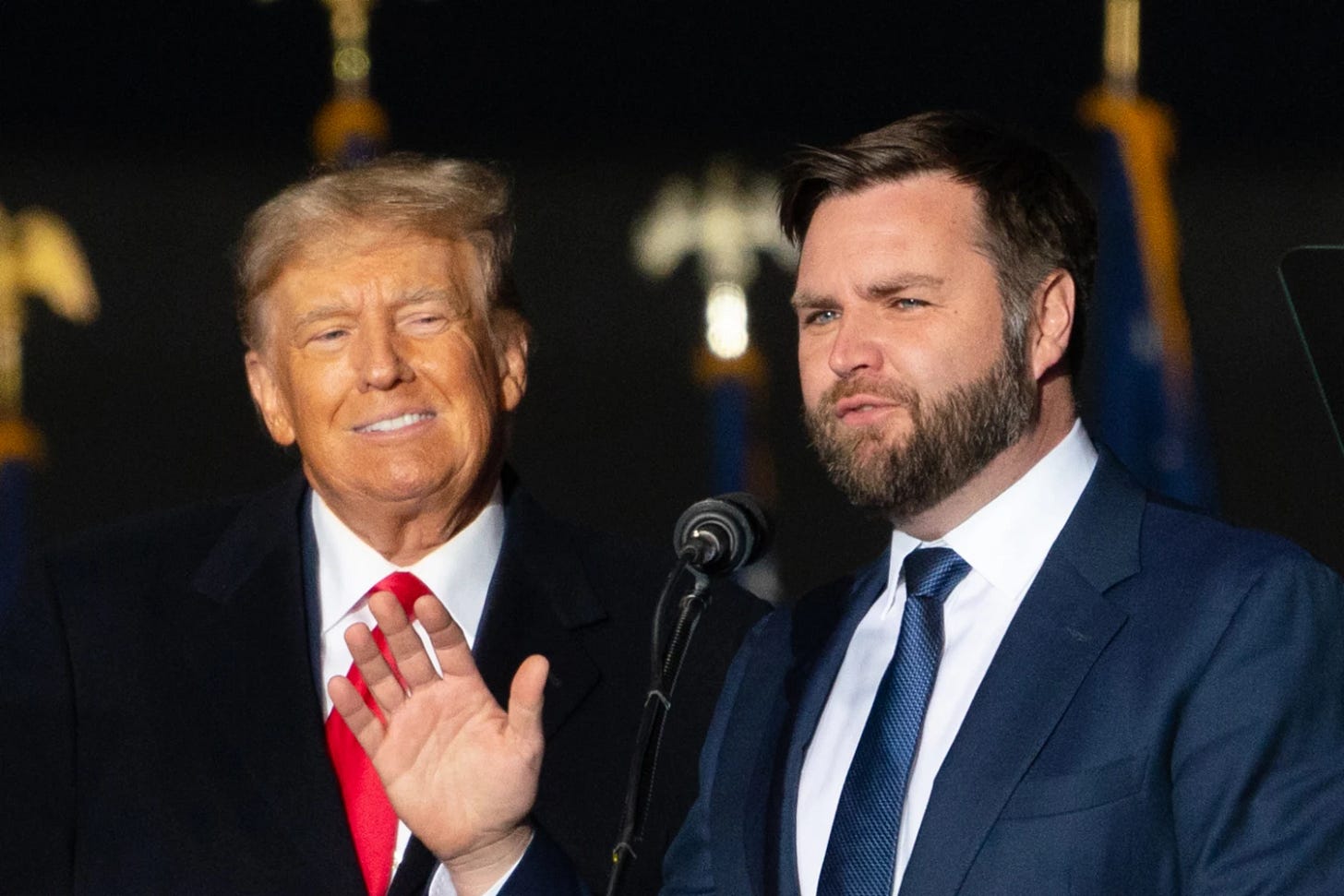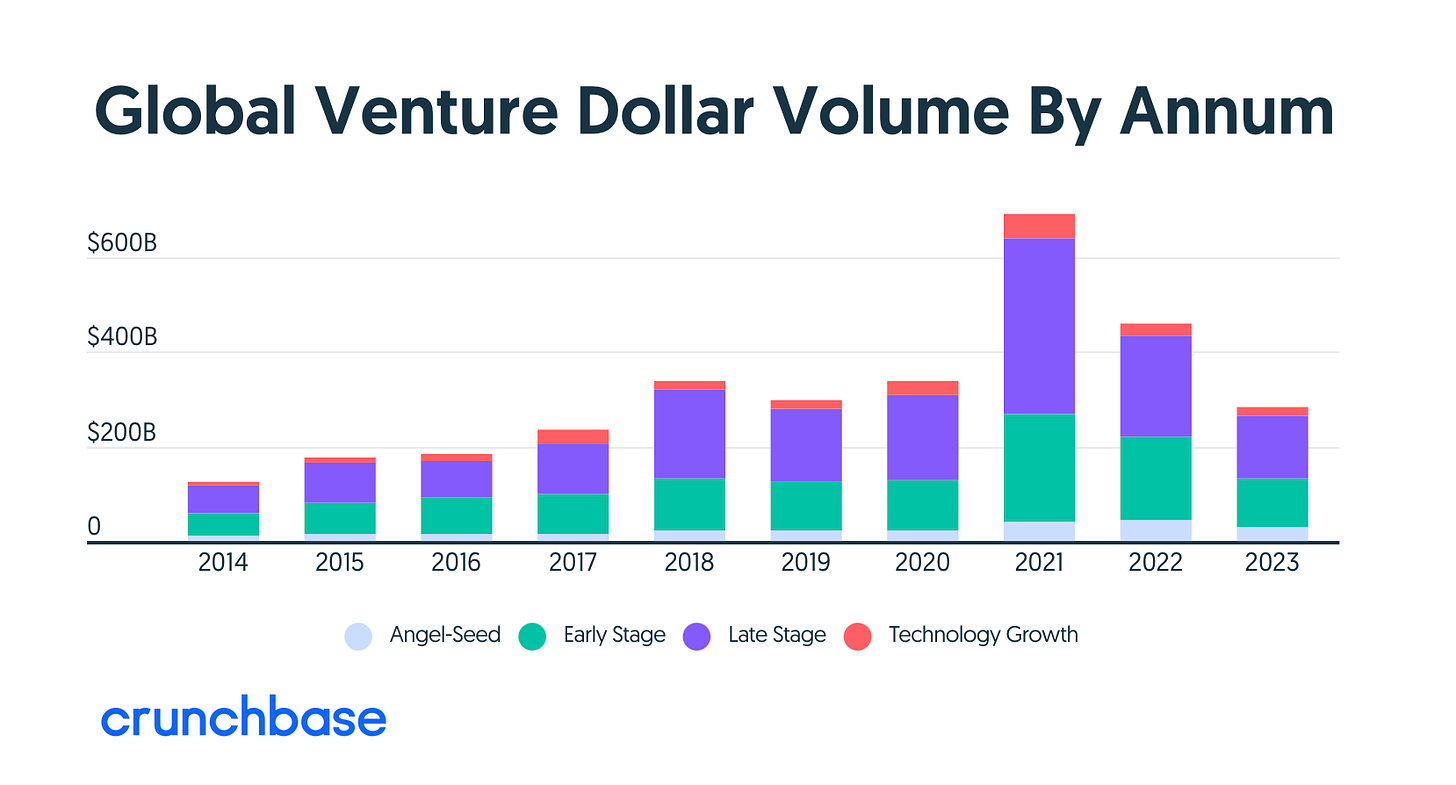J. D. Vance's Anti-Monopoly Right Promises Populist Conservatism, Will They Deliver?
One Trump V.P. Hopeful Wishes to Ally Himself With The FEC
In the race for the coveted spot next to Donald Trump as his Vice Presidential hopeful. Initially, the spot seemed like it would be locked up by South Dakota governor Kristi Noem or South Carolina senator Tim Scott. But recently a new name has been floated: Ohio senator J. D. Vance. A relative outsider, Vance has made broken with traditional Republicans on some economic policies.
Breaking on these has earned him a reputation as a ‘populist’ due to his positions on America’s global role and mild pro family economic policies, something that could prove to be an asset in his appeal to the former president. During a time when free trade and interventionism is incredibly unpopular in the Republican Party, populists like Vance can use their outsider status for a sort of ‘lean and mean’ strategy, where policies can be chosen based on popular appeal. But despite the hopes of some people who recently learned about Catholic Corporatist Integralism on Wikipedia, Vance is still fundamentally a capitalist, if not a completely free market one.
Vance has made some headlines for his unorthodox stance of monopolies: he wants to break them up. It would seem to place Vance in opposition to the Republican Party itself, as any significant domestic industry regulations have been an unofficial heresy in the party since Reagan. Many herald this as a return to conservative populism, either in giddy anticipation, or with bated breath. Some kind of hybrid between Teddy Roosevelt, Huey Long, and Pat Buchanan which would flank the Democrats from the left on economic issues and from the right on social ones.
To be clear, on a less esoteric level, J. D. Vance is talking completely out of his ass when it comes to ‘populism’. He has ties to Purdue Pharma, accepting money from its associates in one case, and working for them at a law firm in another. He got famous for writing a book that came off as patronizing to, if not disgusted by, the people of Ohio he supposedly represents. Even on an interpersonal level, Vance is pretty spineless, having famously trashed Trump before crawling back during his senate race.
Vance would enjoy this reputation as a would-be American Peron, especially while Trump tries to decide on a VP. But Vance is not wading as far from shore as he may appear to be. His seemingly bold moves are being performed only to maintain the wider party line and keep appearances up.
Private monopolies can be good for capitalists, but are never good for capitalism as a whole. Vance recognizes this fact, stating that he sees anti-trust as a tool to encourage a “competitive marketplace, that is pro-innovation, pro-competition” (I don’t really know how a competitive marketplace would be anti-competition). What ‘innovation’ is can be rather subjective, and what we decide is innovation is often of similarly subjective value, but the point remains competition generally results better products for the consumer.
This is a truth that can sometimes be lost in the discussion of the economy, especially in the digital age. The past 15 years have been dominated by a philosophy of Social Darwinism in the relatively unregulated American tech industry. Any given market is seen as a winner takes all race to monopolization where slowing down means death and a total failure to investors. We see intense competition, but it is with the express purpose of ending competition some time in the future.
The Promised Land of start-ups following this worldview, called Platform Dominance by some, is a place among the solidified tech monopolies like Google, Amazon, and Apple. Platform Dominance is achieved through a process known as blitzscaling, where in a company is given enough money by a group of investors to scale its product at a loss and achieve maximum market penetration. Starting in the early 2010s, we saw this blitzscaling attempted in markets like ride-sharing (Uber) or streaming (Netflix). These companies did not succeed completely in monopolization of their wider markets, but were able to accumulate enough resources to be relatively unassailable in the market by virtue of sheer name recognition and loss leading ability. The term blitzscaling was coined by LinkedIn founder, Reid Hoffman. Hoffman explained that he took the word from Blitzkrieg, and that the idea is for companies to scale more aggressively than their competition and dominate their markets using a riskier strategy.
Once this Platform Dominance is achieved, to the victor go the spoils. Venture capitalists become fabulously wealthy off these start-ups with a return on investment rate essentially unseen before in human history. Those investors who did not get in on the ground floor still have a good chance of making money as the ascendent monopoly will probably buy out its competitors for a generous amount. Because of this, any real competition ends, and the company is allowed to start extracting profits from a captive market of consumers.
This is the world J. D. Vance comes from. If you were not aware, Vance got his start working for one of Peter Thiel VC firms, and is a close ally of many Silicon Valley venture capitalists. In fact, Vance’s campaign was essentially saved from ruin by the combination of money from Peter Thiel and David Sacks. Despite coming from a Rust Belt state, Vance is floated by costal VC cash more than any other senator.
So why does J. D. Vance favor increased regulation? After all, his mentor Peter Thiel is famously very pro monopoly, to the extent of declaring that “monopoly is the condition of every successful business”. But the market has changed since Thiel said that back in 2015. The era of blitzscaling is over, and the war of attrition has begun.
Thiel and Vance both personally share a common enemy in this war: Google. Despite being a shining example of monopoly in action, Thiel absolutely despises the company on the ground that it’s spyware for China and stifles innovation. Vance hates it because it supposedly promotes left wing bias and controls the information flow. All of these reasons are not really populist, at least not economically. These concerns do not speak to a disaffected group of Americans more than any of the other standard Republican posturing about wokeness or mainstream media.
Truth is, the tech industry is in dire need of a shake up if venture capitalists are going to survive. A large and immovable company like Google is bad for those who need to keep finding small companies to secure large stakes in. Global investment in venture capital is now at its lowest levels since 2018, not adjusting for inflation. This is bad news for over-leveraged companies in the tech industry and over-leveraged individuals at the venture capital firms who fund them.
These are the people J. D. Vance is ultimately allied with and dependent on. Vance has shed Thiel as a primary benefactor as his former boss sits this election cycle out. Instead, according to a report from Puck, Vance has declared David Sacks to be “one of my closest confidants”. These are the people that stand to benefit the most from a sloppy hack job that divides the biggest tech firms into constituent parts. Similar to how John D. Rockefeller’s wealth grew after the break up of Standard Oil, a breaking of Google or Amazon would allow venture capitalists a way to enter these locked up markets.
Now, this isn’t to say regulation is entirely in service of these aims. In fact, I would argue that the new FTC leadership has been excellent at holding tech companies to account, at least when compared to its lethargic nature before the tenure of Lina Khan. If Google or Amazon were to be broken up, it would fix a lot of problems that stem from their monopolies. However, it might also be a potential disaster for regulators as venture capital investors cash in on these new companies.
Most of this remains hypothetical. Vance is still an underdog in the race for VP, and he’s electorally proven himself only able to avoid total catastrophe via cash and/or repetitional bail outs, such as a surprise Trump endorsement during his primary. That being said, it wouldn’t be totally unexpected for Vance to pick up a spot next to Trump on the ticket. He could also be a boon for cash strapped Republicans going into November, as Vance has proven to be an essential bridge between Republicans and Silicon Valley. We will see on June 6th how well this works.



